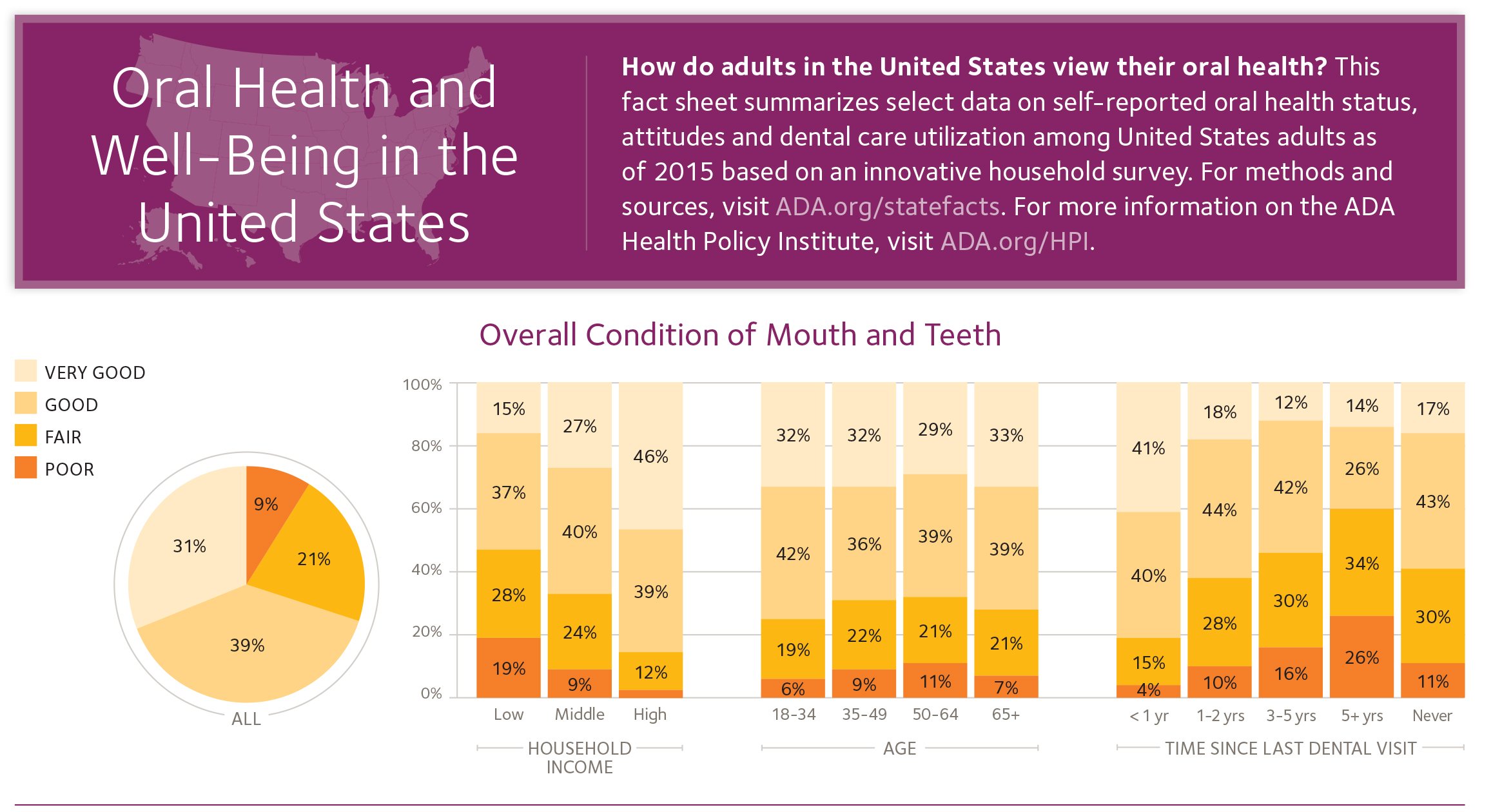By Compassionate Finance on Dec 10, 2018 11:27:09 AM
People don’t like to talk about it. A gentleman dating for the first time in decades guards his smile when meeting a match for the first time. The job hunter tells herself that a muted smile looks more professional in an interview. Both scenarios broach a difficult subject: the social and professional costs of poor dental health.
The issues involved go beyond cavities and gingivitis. They can effect people in very serious social and emotional ways as well, from just hanging out with friends to relationships at work. Dental health can cause true heartache and even have serious financial implications. A huge barrier for patients is access to affordable dental care as credit for dental care can be expensive in the long run (high interest rates) and difficult to obtain (good credit required). We’ll discuss this in more detail later.
DESCRIBING THE PROBLEM.
To get a general idea of how dental health effects people beyond their physical condition, consider the 2015 report from both the ADA and the Health Policy institute: ON ORAL HEALTH AND WELL-BEING IN THE UNITED STATES. Among its many findings is this: 29% of low-income adults and 28% of young adults claim that, quote, “The appearance of my mouth and teeth affects my ability to interview for a job.” 38% of young adults (aged 18-34) reported that they find life “less satisfying” due to the condition of their mouths and teeth. One in four respondents reported that they avoid smiling because of their teeth and poor dental health has caused 23% of respondents to feel embarrassed.  And those feelings aren’t just imagination. A study conducted by Beall Training and Research of Chicago has numbers that show the effect of bad teeth on others. The team of researchers took pictures of eight people. They made two versions of each picture—one with imperfect teeth and another showing the effects of cosmetic dentistry. None of the people in the pictures had visibly rotten or missing teeth. The pictures were shown to 528 Americans, with half viewing the “before” pictures and half seeing the “after” images. These 528 people were asked to make judgments on the individuals in the pictures, determining with just a glance qualities such as intelligence, happiness, career success, wealth, popularity with the opposite sex and kindliness. On a scale of one to ten, people with the cosmetic improvements were judged higher on those qualities than the images without the improvements—in most instances at least a full point. Teeth do influence how people judge others.
And those feelings aren’t just imagination. A study conducted by Beall Training and Research of Chicago has numbers that show the effect of bad teeth on others. The team of researchers took pictures of eight people. They made two versions of each picture—one with imperfect teeth and another showing the effects of cosmetic dentistry. None of the people in the pictures had visibly rotten or missing teeth. The pictures were shown to 528 Americans, with half viewing the “before” pictures and half seeing the “after” images. These 528 people were asked to make judgments on the individuals in the pictures, determining with just a glance qualities such as intelligence, happiness, career success, wealth, popularity with the opposite sex and kindliness. On a scale of one to ten, people with the cosmetic improvements were judged higher on those qualities than the images without the improvements—in most instances at least a full point. Teeth do influence how people judge others.
A UNIVERSAL DETRIMENT.
The influence of superficial dental health isn’t just felt in the U.S. Social workers in Denmark believe that lack of proper dental care keeps people from getting the jobs they need to shake off social assistance. A mother in Auckland became a local celebrity when she went public with the stigma her bad teeth cast over her life—a local dental practice did the extensive work for free. In Britain, a survey by the British Dental Association showed that 77% of people “believe poor oral health could hinder chances of finding employment in public or client-facing roles”. The same British survey found that only 38% believed that being overweight was a detriment to getting a job.
Even a website dedicated to motherhood and children opened up a debate thread to discuss the question of hiring a job applicant with bad teeth. One respondent posted: “No. I wouldn’t. I’d assume they were on meth.” Judging a person on the state of that person’s mouth is a real social issue.
AND ON THE DATING FRONT?
In 2016, Dr. Bruno Silva, the founder of a British implant clinic, conducted an experiment involving online dating and poor teeth. In a similar fashion to the Beall study, he posted identical dating profiles and pictures on a popular dating site, the only difference being the person’s teeth. Over 1500 potential dating matches responded to the experimental “singletons.” The results were startling and clear. People clicked on the profiles that showed good teeth up to significantly more often. In one instance, a woman’s profile picture didn’t give a good look at her teeth and when men clicked on her profile, they could see her dental problems; 60% did not go any further. Dr. Silva commented: “We knew teeth mattered to the dating world, but we didn’t realize by how much until now.” 
A French study used the same online dating profiles to study how people responded to poor teeth. The academics found that, to quote the study directly, “…results indicate significantly and unambiguously that the dental factors play an important role in the physical perception of an individual and consequently in the establishment of a social relationship.”
IS THIS DISCRIMINATION?
Of course, we can’t sue someone for rejecting a dating match due to poor dental health, but is failing to hire an applicant because of bad teeth a form of discrimination? It might feel like it to someone who gets called in for an interview then sees the human resource manager’s face when the applicant smiles. An interesting and revealing discussion thread on Yahoo.com shows the thought patterns of people when it comes to hiring those with bad teeth. Comments include presenting a positive image to the public, the insurance costs of dental repairs and the very notion that you did not take care of your teeth as indicative of your lack of personal responsibility. If you can’t manage your own dental health, how can you manage a job?
Indeed, refusing someone a job because of dental issues may seem discriminatory, especially if the position doesn’t involve regular face-to-face interactions with customers. Still, lawyers will point out that rejection due to poor teeth isn’t legally discrimination. A quick review of legal sites clarifies that having poor dental health is not considered a “protected class.” Technically, it is not discrimination. In human terms, bad teeth results in a second-class group of people based on a physical attribute.
Sparkling personalities, kind natures and razor-sharp intellect are overlooked because a smile isn’t perfect.
YOU CAN’T FIGHT HUMAN NATURE—OR CAN YOU?
It is a fact: poor dental health can be a sign of poor general health. Fact: nice teeth are attractive. People instinctively make snap judgments on superficial characteristics. These are fact. The bottom line is that good oral health is beneficial on many personal and professional levels.
The only fact that can be challenged is this: Most people with poor dental health are in that situation due to financial barriers. Even in Britain, where the National Health Service has, as part of its mandate, the obligation to provide dental care for all citizens, less than 55% receive the attention they need.
Here, where most people aim to get employer-backed dental insurance, the very fact that they need dental care can prevent them from getting a job, which means that they do not have dental insurance, which means they don’t get a job and the cycle keeps playing over and over. In addition, although many dentists today provide dental payment plans and dental financing options for patients, many of those patients either can’t get approved for options like Care Credit dental or if they do get approved, can’t afford the monthly payments. If they are approved, many times the amount they are approved for doesn’t cover the cost of treatment. Those patients often look for dental financing with no credit check, low-interest, affordable monthly payments and easy payment options.
THE CYCLE IS INDEED VICIOUS.
Affordable dental care is how to fight personal and professional discrimination from poor dental health. At COMPASSIONATE FINANCE we do our part by providing a more understanding approval process. We let the patients determine how much they can pay and when. Good dental care costs money—and so it should. But that cost should not keep people from getting the dental treatment they need and want.
When you give patients the option of fighting human nature and, in the process, benefiting their own physical health, you let people be themselves. You let their skills and personality shine and remove a very real and crippling stigma. Talk to us about how to let more people be themselves. We can’t change human nature, but we can make more people smile.
To learn what we can do for you and your patients, contact us by calling 1-866-846-8266.
SOURCES
https://www.ncbi.nlm.nih.gov/pubmed/17532913
http://cphpost.dk/general/dental-doldrums-in-denmark-bad-teeth-costs-jobs.html
https://answers.yahoo.com/question/index?qid=20080627120729AAxNIyJ&guccounter=1
https://www.avvo.com/legal-answers/is-it-discrimination-to-not-hire-someone-with-bad--2187436.html
https://www.dentistry.co.uk/2016/06/15/decayed-teeth-could-stop-you-getting-your-dream-job/
https://pdfs.semanticscholar.org/45cb/0c0b66d2421f6e25ee20efee2aaf9ad2ced1.pdf
https://answers.yahoo.com/question/index?qid=20080627120729AAxNIyJ&guccounter=1
https://en.wikipedia.org/wiki/NHS_dentistry






comments